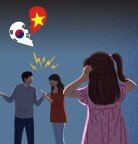The Day Has Gotten So Much Shorter

Elderly poet Kim Jong-gil (78), famous for the scarcity of his writings, has published a new book of poems entitled The Day Has Gotten So Much Shorter. Its been eight years since the last collection of poems written by Kim, who is an honorary professor of English at Korea University.
Although Kim debuted in 1947 through Kyung Hyang Daily News spring literary contest, he has only published five collectionsChristmas (1969), From Hahwoe Village (1977), Yellow Dust (1986), Evening Primrose (1997), and the latest offeringduring his 56 years as a poet. The dearth of published material is a testament to the severity of his attitude toward his own writing. Close friend and fellow Korea University professor Kim Woo-chang praises Kim Jong-gils works as the most emotionally-restrained poems in a literary milieu flooded with exaggerated sentimentalism.
The new collection brings together 70 of the 90 poems Kim has composed since 1997. Having written so much during my latter years after a lifetime of writing too little, Im embarrassed that this might just be the overzealousness of an old man, observes Kim. I usually struggle immensely over my poems, but writing seems to have become easier with old age.
The Day is composed mainly of poems that turn a philosophical gaze on old age, alongside meditations on aging and death.
The faraway mountains leap forward // Objects become clearer / In shadow and silhouette // It is autumn // Yet another autumn / My life has come upon! // But my hair is getting thinner / And my shadow becoming lighter // The day has gotten so much shorter. (Autumn, complete)
The book is divided into three parts: Part 1, The Day Has Gotten So Much Shorter, muses on old age; Part 2, On the Road, was written while the poet traveled in his hometown of Andong, Gyeonggi-do and through the U.S., Japan, and the U.K.; Part 3, Waking at Dawn, contains poems that project a sensibility brought one step closer from old age toward death. Part 3, in particular, shows the poet trying to face his own impending demise with poise, by looking back on the friends and relations that have already left his side, as a tree sheds all its leaves in a single shudder.
Recalling his departure for the U.S. on the day of poet Park Jae-sams funeral in 1997, Kim ponders, While I sat in the plane / Crossing the Pacific lost in thoughts of you / What thoughts crossed your mind as you flew through the sky? (Leaving).
On the funeral of a pianist who had been his friend of 60 years, Kim grasps and caresses, These long fingers that used to play / Melodies that set my own words to music (Fingers).
We met as tender young grass or in the deep green of summer / Some, even as I neared a new sprouting / But we leaned upon each other through rain, wind, and frost // Today, the cold wind whistles beneath the setting skies once more / But I, the last leaf at the end of this bough, / Hang trembling alone (Last Leaf).
Saying that old age has made death seem more familiar, Kim remarks, If you look at the big scheme of things, death is just another part and consequence of all natural phenomena.
Nonetheless, the aging poet, who calmly accepts natures perpetual cycle, addresses an appeal to the heavens, a hope that cannot be realized by the strength of man alone, in the final poem entitled Man and Wife.
Side by side each day these fifty years / Theyve become soiled and chipped // But the rice bowl and the soup bowl belong together / / If they should break / Could they not break together ?
Sue-Jean Kang sjkang@donga.com







